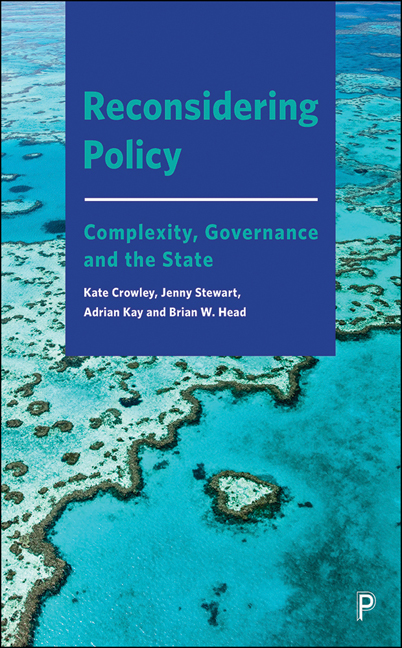Book contents
- Frontmatter
- Contents
- Detailed contents list
- List of tables
- List of abbreviations
- Notes on authors
- Preface: Re-Thinking the Policy Sciences after the ‘Governance Turn’ – Identifying and Creating a (more) Capable State
- 1 Reconsidering Policy – our Agenda
- 2 Reconsidering Policy Systems
- 3 Reconsidering Institutions
- 4 Reconsidering the State
- 5 Reconsidering Borders
- 6 Reconsidering Advice and Advisory Systems
- 7 Reconsidering Information
- 8 Reconsidering Implementation
- 9 Reconsidering Policy Change
- 10 Reconsidering Policy – our Agenda Revisited
- References
- Index
7 - Reconsidering Information
Published online by Cambridge University Press: 23 February 2021
- Frontmatter
- Contents
- Detailed contents list
- List of tables
- List of abbreviations
- Notes on authors
- Preface: Re-Thinking the Policy Sciences after the ‘Governance Turn’ – Identifying and Creating a (more) Capable State
- 1 Reconsidering Policy – our Agenda
- 2 Reconsidering Policy Systems
- 3 Reconsidering Institutions
- 4 Reconsidering the State
- 5 Reconsidering Borders
- 6 Reconsidering Advice and Advisory Systems
- 7 Reconsidering Information
- 8 Reconsidering Implementation
- 9 Reconsidering Policy Change
- 10 Reconsidering Policy – our Agenda Revisited
- References
- Index
Summary
Introduction
Information (observations on and about the world) is the basic material of all public policies, and appears in many guises across a wide range of policy-related literatures. These literatures include analyses of how policies are made, as well as inquiries into the content of policy in the form of ideas and knowledge. In this chapter, we suggest that information, broadly understood, warrants a prominent place in the general analysis of public policy. It is not as if information is ignored in contemporary analysis, but rather, that its presence is taken for granted. Information needs to be problematised if the implications of the growing complexity and difficulty of ‘doing’ policy are to be understood and addressed. In this chapter, ‘reconsidering’ means using information as a lens with which to clarify both the content and conduct of policy.
Two streams of reconsideration are explored: information within public policy, and information as an object of public policy. The first stream brings together key concepts in policy analysis, and enables us to scope the importance of informational processes within policy systems. Reconsidering in the second sense enables us to identify shifts in the relationship between information and public policy as a field of action. Both perspectives help us to draw conclusions about the relationship between public policy and the state.
Information matters because governing is impossible without information on the governed. At a very basic level, states cannot survive without taxation, which requires information on citizens – who they are, where they live and what they own. Tax policies shape and refine relationships with the state based on this information. Similarly, health and pensions policies exist in and through the information that is held on citizens and the way it is deployed.
In addition, information has an intimate relationship both to governance (Peters, 2016) and to public policy. At the policy level, the neo-liberal ascendancy in Western democracies has privileged market-oriented governance in the form of national and international deregulation (and re-regulation), and a dispersal of decision-power away from the nation-state and towards corporate interests and other (more strategic) states.
- Type
- Chapter
- Information
- Reconsidering PolicyComplexity, Governance and the State, pp. 119 - 140Publisher: Bristol University PressPrint publication year: 2020



